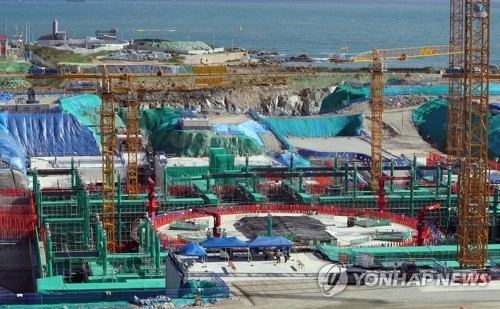News & Event
- Home
- News
- News & Event
According to Yonhap News,
(SEOUL=Yonhap News) South Korea's state-run nuclear operator said Friday it will consult with local contractors to resume work on building two new reactors as early as next month and compensate the damages incurred by a three-month break after a state commission voted in favor of their construction plan.
The Korea Hydro & Nuclear Power Corp. (KHNP) halted construction of the Shin Kori-5 and Shin Kori-6 units in the southeastern city of Ulsan mid-July so as to allow a state commission to engage in a public debate and opinion-gathering process. The commission earlier in the day recommended the resumption of the construction project for the commercial atomic reactors.
President Moon Jae-in pledged to abandon the construction plan during his election campaign as part of a bold nuclear phase-out policy, but the high-stakes decision was put to a vote as already 1.6 trillion won (US$1.4 billion) had been spent on the 8.6 trillion won project that began last year. About 30 percent of the construction was complete as of June.

The construction site of the Shin Kori 5 and 6 units in Ulsan, 414 kilometers south of Seoul, is shown in this picture taken on Oct. 20, 2017. (Yonhap)
As the government is set to accept the recommendation during a Cabinet meeting on Tuesday, the Ministry of Trade, Industry and Energy said it will consult with the KHNP and its contractors to discuss the necessary steps and compensation measures.
"When the official decision-making process is completed, we will work with related organizations to take follow-up measures without delay," Park Won-ju, a senior ministry official in charge of energy policy, said in a briefing. "We will also reflect the commission's recommendation on the reduction of nuclear power in the broader energy transformation policy."
Park said it would take at least 2-4 weeks to get the construction site ready, expecting actual formal work on the site to resume in about one or two months.
The commission's decision came as a relief to local builders and residents, who have strongly opposed any moves to stop construction and threatened to take legal action to obtain financial compensation.
Rather than ending the ongoing construction of the advanced plants, they called the government to gradually shut down older reactors, some of which were built more than 30 years ago.
The KHNP estimated the financial damage on local contractors to be about 100 billion during the three-month hiatus and set out a plan to use reserve funds to compensate them.
Construction companies welcomed the decision and vowed to safely proceed with the construction to reflect lingering public safety concerns.
Samsung C&T Corp., which has a 51 percent stake in the project, said it will prepare follow-up measures when the government makes the final decision.
Doosan Heavy Industries & Construction Corp., which holds a 39 percent stake, welcomed the commission's announcement, pledging to make efforts to safely proceed with the process.
While construction of Shin-Kori units 5 and 6 was scheduled to be complete by 2021 and 2022, officials say the schedule could be delayed at least 4-5 months due to the unexpected construction suspension. Further delays could also take place as past projects have seen cost overruns and delayed schedules due to safety issues.
For instance, Shin-Kori No. 3, which began commercial operation in December 2016, was three years behind schedule as it had to replace cables and valves due to falsified reports on their quality.
As the state commission recommended a reduction in nuclear power down the road, the government said it will increase investment in renewable energy and enhance nuclear safety and transparency.
"Although we plan to gradually phase out nuclear power, it would not cause problems in the nation's energy supply by raising the mix of renewable and eco-friendly energy sources," Park said.
The government will announce an energy road map later this year that will include plans to increase the ratio of renewable energy to 20 percent of total energy sources by 2030.
While the new energy initiative has sparked concerns over a hike in electricity costs, the government said it would adopt a smart electricity management system to complement the reduction of traditional energy sources.
"The government won't raise electricity costs until 2020, and will make efforts not to put a burden on consumers afterwards," the government official said.
ejkim@yna.co.kr
Copyrights Yonhap News. All Rights Reserved.
Reprint or redistribution without permission is prohibited.
Source: Yonhap News (Oct. 20, 2017)